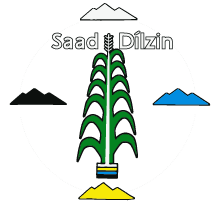Introduction to Navajo Questions
Any competent speaker of any language will be able to form questions. This resource is a combined grammar and lexicon of Navajo questions. We provide a description of three kinds of questions along with glossed examples and audio recordings of them. We think this resource will be useful to students and teachers of this language, and to professional linguists within and outside Navajo communities.
We distinguish three distinct kinds of questions: Yes/no questions, Content Questions, and Alternative Questions. We treat Tag Questions as a subtype of Yes/no questions. For this project we draw on previous work by Fernald & Perkins (manuscript), Young & Morgan (1987), Young, Morgan & Midgette (1992), and others cited in References [link].
| Da’ | Na’nízhoozhígóó | díníyá? |
| Q | Gallup-to | 2-go.F |
| Are you going to Gallup? | ||
| Mary | ha’át’íí | nayiisnii’? |
| Mary | what | 3-3-buy.P |
| What did Mary buy? | ||
| ’Atsį́’ísh | ’éí | doodaii’ | łóó’ísh | nínízin? |
| meat-Q | TOP | or | fish-Q | 3-2-want.NI |
| Do you want meat or fish? | ||||
Example (1) is a yes/no question, which has ‛yes’ or ‛no’ as an answer. Questions like this are
used to ask whether a particular statement is true or not. In this example, the statement being
asked about is Na’nízhoozhígóó díníyá, which means ‛You are going to Gallup’
Content questions, like example (2), do not have simply ‛yes’ or ‛no’ as an answer.
Rather than supplying a statement and asking whether it is true or not, they have the effect of
providing a statement with some missing information, and they ask what that information is. In
(2), the idea is that Mary bought something, and the question asks what that something is. Alternative questions present the addressee with a choice between two or more options.
Note that the English gloss in example (3) can be understood as either a yes/no question (if the
intonation is rising on fish) or an alternative question (if the intonation is falling on fish). In
Navajo, the sentence is an alternative question for which the appropriate answer will indicate
which one of the choices is desired.
Glossing conventions and a note on morphology are here [link].
An example search has returned 50 entries
’Atsą́ą́’ ła’ jóyą́ą’ le’.
ribs some 4-eat.O desire’ałk’idą́ą́’
’Ííłta’ dóó ’iiłghaazh.
1-read.P CONJ 1-sleep.P-ą́ą́h
-ee
-k’eh + -jí
in a language e.g. diné k’ehjí ’in Navajo’
bookmark-shą’
Ahwééh yishdlį́į́ ’áko ’índa ch’éénásdzíd.
coffee 3-1.drink.P when 3-1.wake.up.PBéésh bii’ kǫ’í bizooł dego deez’á.
stove 3-pipe up 3-extend.SPNBichidí yichǫ’ yę́ędą́ą́’ ’ashkii t’áani’ nálwod.
3-vehicle 3-P-ruin past boy on.foot 3-P-returnCh’óóshdą́ą́dą́ą́’ Diné Bizaad t’éiyá bee yádeilti’ nít’ę́ę́’.
formerly Navajo language only 3-with pl-3-speak.I pastChidí binaashnish yę́ę ’áádóó t’óó ni’ kwíishłaa.
vehicle 3-1-work.CI past and.then just stop 1-stop.PChidí k’adę́ę yichxǫǫh lágo naháłnii’.
car almost 3-fall-apart.I altered 3-1-buy.PDa’ Ron saad neiskáá’?
Q Ron word 3-3-investigate.Pdadiilbish
pl-3DO-1dpl-boil.it.Fdadoołbish
pl-3DO-2dpl-boil.it.FDah díníilghaazhísh ’íilnilaa?
fry.bread-Q 3-2-make.Pdeiilbéézh
pl-3DO-1dpl-boil.it.Ihaa + Neuter V
how / what V. The ’h’-expressions formed with ’haa’ plus a neuter verb are used to pose questions about “physical characteristics, quantity, and degree”.
bookmarkhaa nóolin
haahláyéé
Haash nízah kodóó nighanjį’?
how-Q 3-long.N here-from 2-home-tohadaoołgizh
pl-3DO-2dpl-cut.it.out.Pjididoołhįh
3DO-4-melt.it.FK’aa’ísh ’aní’á biyaa doodago daats’í báhátis ’ayiist’oh ?
arrow-Q bridge 3-under or perhaps 3-over 3-3-shot.PKin Łánídi daats’í ’éí doodago Bee’eldííldahsinildiísh naniná?
Flagstaff-at perhaps or Albuquerque-at-Q 2-go.around.CIKwii nináá’nísh’aah.
here again-3-1-place.RMary bimá sání yá ’ata’ halne’.
Mary 3-grandmother 3-for indef-between 3-talk.DIMary ha’át’íí nayiisnii’?
Mary what 3-3-buy.PMósí yázhí bimá yits’ą́ą́’ yóó’ííyá.
kitten 2-mother 3-from away-3-go.PNáás heesháałgo chidí bine’ ’ííyá.
forward 1-step.Prog-GO car 3-behind 1-go.PNédáá dóó bikáá’adání bik’i ndinís’eez.
1-sit and table 3-on 1-place-1-foot.Pnidasoolá
pl-3DO-2dpl-carry.a.ropelike.thing.around.Pcarry a ropelike thing around, 2nd person plural
bookmarknidííleeł
3DO-2-carry.a.ropelike.thing.around.Fcarry a ropelike thing around, 2nd person singular
bookmark



